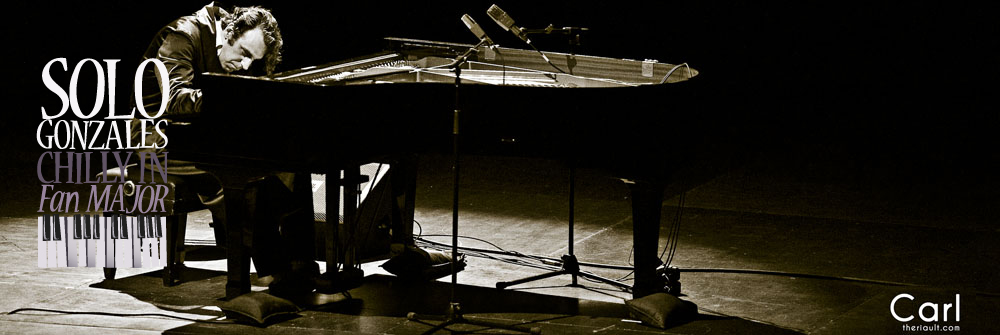Recently, a considerable amount of interest was generated when it was revealed that musician, and sometimes piano-battler Andrew W.K. was being ‘groomed’ as U.S. Ambassador to Bahrain.
I’m just blown away. After a year of planning, the US State Dept. just canceled my Middle East trip because I’m too party.
— ANDREW WK (@AndrewWK) November 26, 2012
Unfortunately, the appointment fell through, but Andrew W.K. vows to visit Bahrain regardless. Being officially appointed to a country is obviously an honour, but becoming an ‘unofficial’ ambassador takes much more time and effort, and may ultimately prove to be even more rewarding.
From time-to-time, Gonzales brings up the notion of Canadian ‘identity’, or (more accurately) the lack of one. As a relatively young and diverse country, Canada has not had the centuries of history and evolution afforded by many European and Asian countries. Nor has it had the American ‘melting pot’ mantra applied to its immigrants and citizens. As such, Canadians as unsure as to exactly what makes them ‘Canadian’. When asked, many Canadians generally make reference to a feeling of ‘survival’. Although there is an aspect of physical ‘survival’ in a harsh climate, most Canadians now live fairly comfortable lives. The ‘survival’ most are referring to is the ability to maintain Canadian language, religion, and culture in light of global influences. Many residents of Canada are recent immigrants, who brought and maintained their own identity and culture, which Canada constitutionally protects and celebrates. In a large and diverse country (culturally and geographically), Canadians sometimes feel like strangers in a foreign land. As a virtuoso with a penchant for classical melody and structure, Gonzales must have felt like a musical foreigner as well, especially given Canadian’s continued fixation on guitar-oriented alternate rock. Gonzales said that his early influences included his old-world « Wagner-loving » grandfather, and the new-world instantly-digestible music found on MTV (or MuchMusic in Canada). These were overt influences, but there may have been other, more subtle influences at work over time.
Gonzales was born in what could be considered the ‘heart’ of Canadian identity: Montreal. Half European, half North American, a mixture of French and English, with equal parts art and commercialism, there couldn’t possibly have been a better location to give birth to an entertainer whose eventual quest would be to meld the old and new worlds of music. Montreal epitomizes the unique relationship between English and French in Canada, which is seen as one of the tenements of Canadian identity. All Canadians are reminded of this each time they pick up a product, which must by law be in French and English. The languages influence each other and penetrate the Canadian psyche at levels that even Canadians don’t fully understand or comprehend. In a sense, the melding of languages, combined with the unique culture of its immigrants, is what prevents Canada from completely losing its identity, and is cited as a key discriminant between Canadians and Americans. In the same manner, Gonzales’ meld of old and new is a way to save the old by combining with the new; Gonzales has his own multilingual ‘product labels’. While the original Solo Piano was primarily rooted in French (France French, as opposed to Canadian French) with western influences, Solo Piano II is more complex and shines with a broad spectrum of colours. From ancient beats, to classical composition, from vaudeville to the synth-driven pop of today. All originating from one man on a single instrument. Gonzales mentions that many of the songs originated from playful sequences during the mandatory warm-ups that a pianist must endure when faced with a foreign piano each night. Retained melodies are worthy of further exploration; others are forgotten over time.
Where do the melodies stem from? For Gonzales, they may form partially from the mathematical relationship between notes and chords, and partially from the emotional impact of certain harmonic sequences from studies and experience. It is only a guess as to how much his subconscious influences the musical output of his « noodling”. It’s possible that Gonzales absorbed Canadian identity in his youth and is now creating music that contains a truly Canadian experience. The huge gaps between cities, the ruggedness, big skies, the warmth of a campfire, the multicultural and multilingual core of Canadian identity, and the sense of humour and self-deprecation one tends to pick up as a protection mechanism living next to the most powerful country in the world. By leaving Canada, Gonzales could share his Canadian experience with the world through his music, teachings, and humour.
The core of Canadian exports are its abundant natural resources; which are invariably turned into products in other countries, then distributed throughout the globe. In a strange parallel, Canadians who leave Canada tend to follow the same path; the lack of an identifiable Canadian identity gives Canadians the ability to quickly adapt and be shaped by other countries and cultures, while still retaining Canadian values at the their core. It is an unfortunate but necessary fact that Gonzales had to leave Canada in order to be reshaped and influenced by European history and culture, but in the end, the global, multicultural, and multilingual ”man of his time” represents an ambassador for Canadian identity, values, and not just surviving, but excelling against a host of odds.
